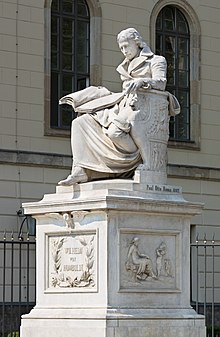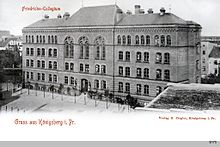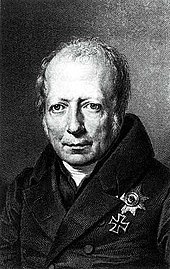New humanism
New humanism refers to the resurrection of the (literary) humanist movement in Germany from around 1750. The school historian Friedrich Paulsen (1885) coined the term .
Emergence
Several currents contributed to the creation:
- Important classical scholars published innovative findings and new interpretations in classical studies : Johann Matthias Gesner in Göttingen, Johann August Ernesti in Leipzig, Christian Gottlob Heyne in both places and Friedrich August Wolf in Halle and Berlin ( Homeric question ).
- Ancient art history and archeology were re-inspired by Johann Joachim Winckelmann's idealistic view of Greek art (1755).
- The idea of "humanity" became a central concern of German classical music, which, in the search for human "nature" reignited by Rousseau , came across antiquity and especially the Greeks ( philhellenism ): Gotthold Ephraim Lessing , Johann Gottfried Herder , Johann Wolfgang von Goethe , Friedrich Schiller and Friedrich Hölderlin .
- Friedrich Gedike founded the old language teaching in Prussia with a new orientation at the Friedrich-Werderschen Gymnasium and at the Berlinisches Gymnasium zum Grauen Kloster .
- Wilhelm von Humboldt developed a new view of the Greek language and culture as a path to exemplary human existence ( on the study of antiquity and Greek in particular, 1793).
- Broad circles of the German bourgeoisie recognized neo-humanism as an opportunity for social emancipation through personal education .
Already the classical humanism of the late Middle Ages ( Petrarca ) and Renaissance time was had by intensive study of Roman and Greek literature, some of which are rediscovered, characterized ( studia humaniora ). Antiquity and especially Roman ( Cicero ) were perceived as a classic human pattern and ideal ( humanitas ): language separates humans from animals, educated language from barbarians and creates access to the sphere of the spiritual and divine. Both in the Protestant school of scholars, which wanted to create access to the Bible in the original text ( Philipp Melanchthon ), and in the Catholic Jesuit grammar school , reading classics, interpreted in a Christian way, determined the course of education. The Latin clearly took precedence.
But the progress-conscious Enlightenment significantly reduced the importance of antiquity in favor of modern science and literature. Linguistically, this was expressed in the increasing predominance of French in Western Europe. In German school pedagogy ( philanthropism ), criticism was made of the one-sided dominance of the ancient languages and of their use for young people's development, and the school canon was changed in the direction of usefulness and present-day orientation. In some cases, this aimed directly at a class and professional education.
program

The classical philologist Friedrich August Wolf formulated the new humanistic ideal: " humanities ... include everything which purely human education and increase of all mental and emotional forces to a beautiful harmony of the inner and outer man is transported." ( Presentation of Alterthumswissenschaften , edition 1832, S . 45)
After the political collapse of the Holy Roman Empire, the theologian Friedrich Immanuel Niethammer in Bavaria (1808) and Wilhelm von Humboldt in Prussia drew consequences for the reorientation of the educational system. In the course of the Prussian reforms in 1809, the spiritual father of German liberalism became head of the section of culture and education for 16 months and designed his concept in the Königsberg and the Lithuanian school plan . This is how the humanistic grammar school came into being , which significantly regulated university access in the 19th century. Humboldt founded the Berlin University in 1810 to continue the course of education and as a model for a new scientific concept , in which the new profession of grammar school teacher (introduction of the examen pro facultate docendi in 1810 as the forerunner of today's state examination ) had to be learned through the study of classical philology . Humboldt's neo-humanist-minded comrades-in-arms included Johann Wilhelm Süvern , the high school director , August Ferdinand Bernhardi , Reinhold Bernhard Jachmann and the theologian Friedrich Schleiermacher , who were members of the Scientific Deputation , but who had different organizational ideas on individual issues.
Against the (common) benefit of Enlightenment pedagogy, neo-humanism placed the value of the individuality of each individual, which must be trained in school education regardless of social and current needs. The language is regarded as the center of human existence, a formal language education man therefore come to themselves. Learning the ancient languages, especially the Greek , serve this purpose, especially because they could represent the structures of language pure. For Humboldt it follows that learning is also good for the future carpenter, which in the further history of the school, however, remained largely a theoretical postulate. In addition, every learner receives material access to a culture that is interpreted as ideal, precisely through the Greek language, which, as a source of spiritual inspiration, stands in contrast to the torn, endangered, anti-human present. The way to freedom and the ability to mentally withstand the merely current leads through humanistic education. For Humboldt, any professional training should only take place later, but the properly educated person will be able to do all the more for society with his energies in professional life. In the humanistic grammar school, therefore, the ancient languages are completely in the foreground, even if, against Humboldt's intentions from practical school needs, Latin was soon put in front of Greek again ( Süvern Reform 1816/19 ).
Effects and criticism

Despite its distance from the modern world in the German-speaking area, the humanistic grammar school was able to maintain its high prestige in some cases up to the present day. At the same time, classical education also retained its recognized position in the rest of Europe, even if it declined more sharply in the school system. From various ideological standpoints, the ability to look at one's own time from a critical distance based on the ancient texts and to relativize it in terms of its standards is particularly emphasized.
Many of the intentions of the new humanist fathers were lost in the 19th century when they were implemented in practical school policy, especially because the state and parents enforced their less idealistic claims (subservience, nationalism, cost reduction, usefulness). The classical philologist and philosopher Friedrich Nietzsche criticized this early on. Many pupils experienced the grammar school as a pedantic, unfamiliar cramming school, to which reform pedagogy in the 20th century opposed alternatives. Kaiser Wilhelm II personally influenced the fiercely contested abolition of the Latin school essay in 1890 and thus corresponded to the widespread feeling of ending an anachronism. The access monopoly of the humanistic grammar school to all university courses did not cease to exist in Prussia until 1900 , when graduates of the Realgymnasium and the Oberrealschule with little or no Latin lessons received a generally recognized high school diploma .
New humanism is also under fundamental criticism because the aristocratic-elitist trait, which de facto did not provide for a higher school for many young people, made having education an external distinguishing feature from the "masses" and thus increased their social exclusion. The educational-theoretical orientation towards an antiquity, which was also misinterpreted, the image of which was radically revised in classical studies , no longer fit into the industrial age, it hardly seemed to have any real practical value for life, especially for the natural sciences . The sharpest critics therefore came from the ranks of the natural sciences, even if important figures in the guild such as Planck , Heisenberg or Weizsäcker took the diametrically opposite view. Verbalism, the concentration on the linguistic side of the human being, and the formal conception of education , which placed language as the center of intellectual activity as opposed to encounters with realities and active communication, were also questioned. This also became a problem area, which finally affected and ended renaissanceism . The didactic specialist in ancient languages, Friedrich Maier , sparked a controversy when he questioned the educational effect of the humanistic grammar schools in the Nazi state.
literature
- Friedrich Paulsen : History of the learned teaching , Volume 2, The learned teaching under the sign of neo-humanism , Leipzig 1885
- Clemens Menze : Wilhelm von Humboldt's educational reform , Hanover 1975 ISBN 3-507-38149-4
- Herwig Blankertz : The History of Education. From the Enlightenment to the Present , Wetzlar 1982 ISBN 3-88178-055-6
- Bruno Hamann: History of the school system , 2nd edition, Bad Heilbrunn 1993 ISBN 3-7815-0748-3
- Ingrid Lohmann: Curriculum and general education in Prussia. A case study on Schleiermacher's curriculum theory , Frankfurt am Main, Bern, New York: Peter Lang 1984.
- Herwig Blankertz / Kjeld Matthiessen : Neuhumanismus , in: Dieter Lenzen (ed.): Basic pedagogical concepts , rowohlts enzyklopädie, 6th edition Reinbek 2001, vol. 2, pp. 1092–1103 ISBN 3-499-55488-7
- Manfred Fuhrmann : Latin and Europe. The alien foundations of our education. The history of learned teaching in Germany from Charlemagne to Wilhelm II. , Cologne 2001 ISBN 3-7701-5605-6
- Hubert Cancik : Europe - Antiquity - Humanism. Humanistic experiments and preliminary work , Transcript Verlag, Bielefeld 2012 ISBN 3-8376-1389-5
Web links
swell
- ↑ Ceremonial speeches about the value of ancient languages are legion. Some examples ( Memento from April 4, 2009 in the Internet Archive )
- ↑ Melanchthon-Gymnasium Nürnberg: The Opinion of Others ( Memento from August 1, 2007 in the Internet Archive )
- ↑ Friedrich Maier: Humanistic Education and Values Education. Attempt to determine your position. In: Forum Classicum . 3/2006, p. 172 ff. ( Online )
